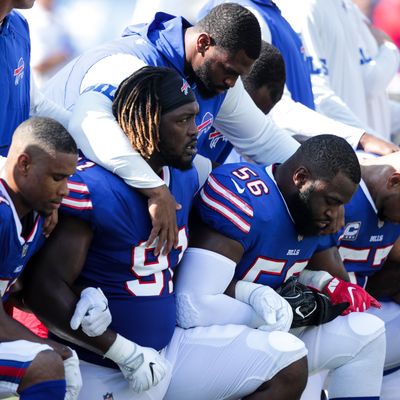
Around 150 NFL players took a knee or practiced other forms of protest during the national anthem before their games on Sunday, a clear and coordinated response to President Trump’s attacks on the league and its players over the weekend. Among the players who remained standing while the anthem played, many uncharacteristically locked arms in solidarity with their teammates, while those protesting — most of whom were black — knelt, sat, raised a fist into the air, or skipped the anthem altogether. Three entire teams decided not to appear on the field at all, only emerging from their locker rooms after the anthem was finished.
On Friday night, Trump indirectly called player Colin Kaepernick a “son of a bitch” for kneeling during the anthem as a form of protest and suggested that any player who did the same should be fired. Following the widespread protests on Sunday, Trump repeated his criticism on Twitter, saying that “kneeling is unacceptable” and retweeting a call for a boycott of the NFL. Less than ten players practiced any form of protest during last week’s games, and well over ten times as many did so on Sunday, so Trump’s rhetoric did not have the effect he seems to have intended.
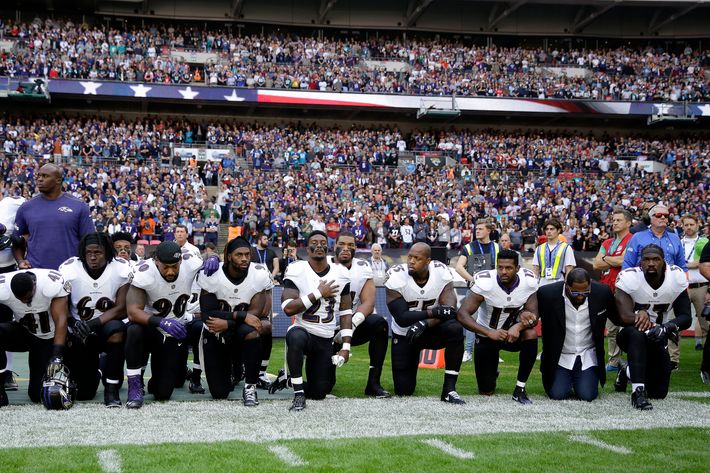
The protests got started in London, where the first game of the day was played between the Baltimore Ravens and Jacksonville Jaguars on Sunday morning. At least 17 players from the two teams locked arms and knelt during the national anthem. (The same players stood for the singing of the U.K. anthem.)
Jaguars owner Shad Khan, who donated money to President Trump’s presidential campaign, was also on the field during the anthem, arm-in-arm with some of the players who remained standing. He later emphasized support for his players and expressed bafflement at Trump’s comments. Ravens owner Steve Bisciotti said afterwards that his players had the right to protest. “We recognize our players’ influence,” he said in a statement. “We respect their demonstration and support them 100 percent. All voices need to be heard. That’s democracy in its highest form.”
Such demonstrations of unity between players, team officials, and owners were the norm on Sunday.
As seen below, many more players protested throughout the day. In many cases, when players didn’t protest directly, teammates locked arms in a clear sign of solidarity. Taking another tack, the Pittsburgh Steelers, Seattle Seahawks, and Tennessee Titans chose to remain in their locker rooms while the anthem played before their respective games.
From the late-afternoon game between the Kansas City Chiefs and Los Angeles Chargers, many members of the Chiefs sat out the anthem, while others, like quarterback Alex Smith, stood behind the bench far from where the team normally lines up for the tradition. On the other side of the field, some Chargers sat while a handful knelt for the anthem, and the rest of the team, along with owner Dean Spanos, locked arms in solidarity. “Our players, as do all Americans, have every right to speak their mind and from their heart — it was an honor to join them on the field today,” Spanos later said.
About 20 members of the New England Patriots knelt for the anthem on Sunday (quarterback Tom Brady stood, locking arms with his teammates):
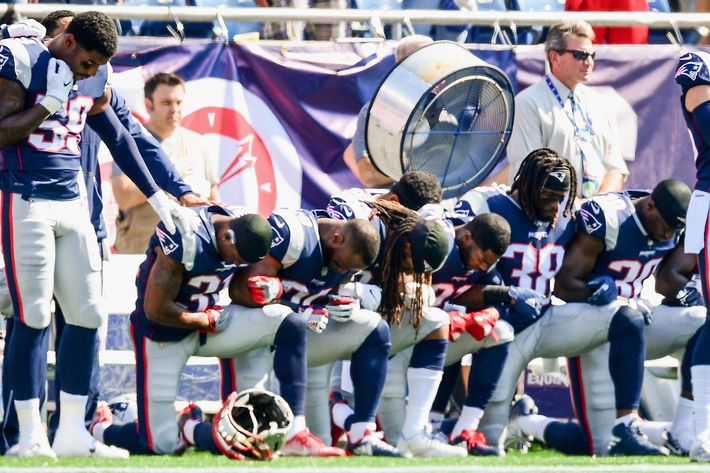
Earlier, Patriots owner Bob Kraft, a well-known personal friend of President Trump, joined other owners and officials in releasing a statement saying he was “deeply disappointed” by Trump’s comments.
Meanwhile in Detroit, several members of the Lions knelt, as did a few of the Atlanta Falcons across the field. The Falcons also linked arms for the anthem, joined by owner Arthur Blank. But what’s most notable about what happened in Detroit was that Rico Lavelle, who sang the national anthem, knelt at the end of his rendition as well.
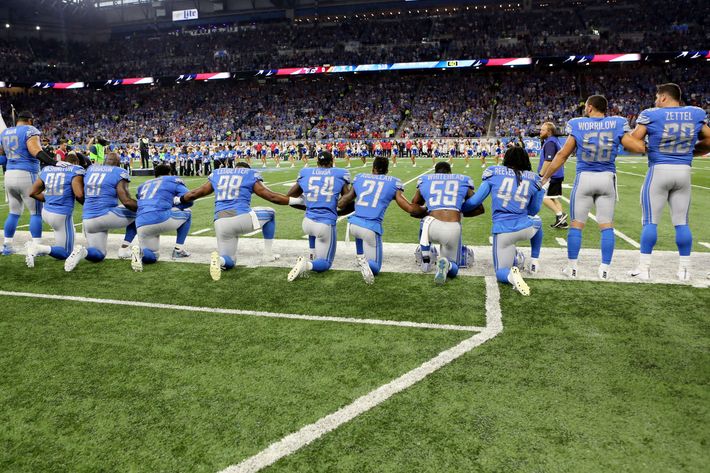
In upstate New York, a whopping 32 members of the Denver Broncos knelt for the national anthem, while several members of their opponent team, the Buffalo Bills, did as well.
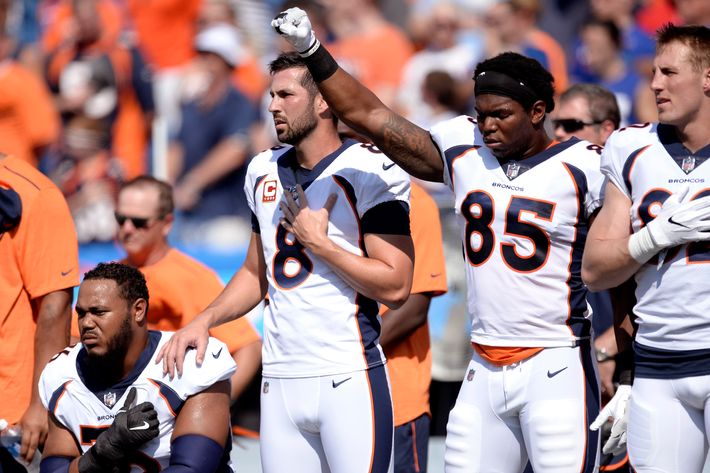
At the game between the New York Giants and Philadelphia Eagles, three Giants knelt, while none of the Eagles did. A few Eagles did raise their fists for the anthem, however, as did the Giants’ Odell Beckham after scoring later in the game. (Beckham also earned a penalty after celebrating an earlier touchdown by pretending to pee like a dog on the field, but did not receive one for holding his fist in the air.)
In Indianapolis, where the Colts were playing the Cleveland Browns — and where there was an enormous American flag draped across the entire field — members of both teams took a knee during the protest while remaining linked to their teammates.
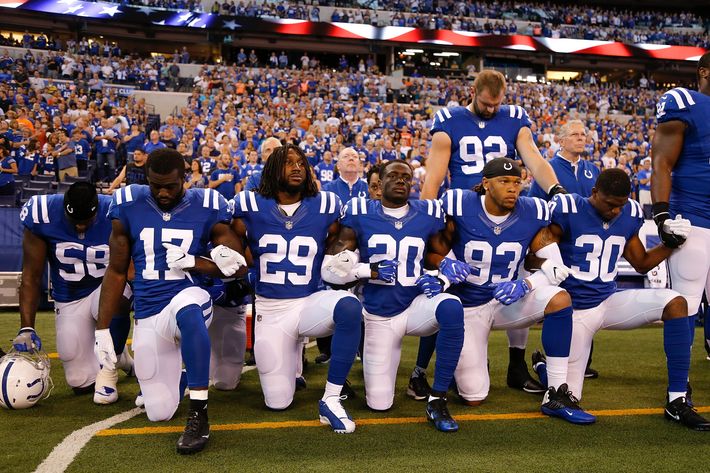
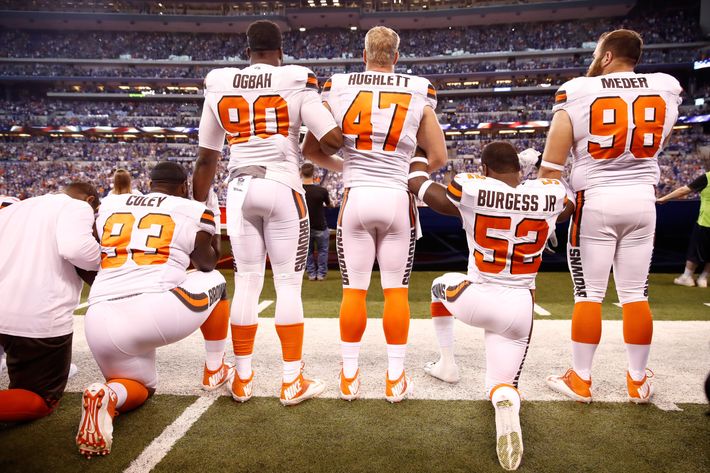
Ten members of the New Orleans Saints sat out the anthem before their game against the Carolina Panthers. Only one Panthers player apparently skipped the anthem.
One Saints player continued his protest during the game, as well:
No players on the Houston Texans, New York Jets, Minnesota Vikings, or Chicago Bears knelt for the anthem at their games, but most of the players on those teams locked arms in solidarity for the ceremony.
Pittsburgh Steelers coach Mike Tomlin announced on Sunday morning that, wishing to avoid any semblance of division, the team would not even take the field for the national anthem before their game against the Bears on Sunday, but would remain in their locker room.
Tomlin eventually stood on the field for the anthem without his team, though one player, a U.S. Army veteran, did leave the locker room to stand near the tunnel for the anthem:
CBS and Fox have said they will air the playing of the national anthem live before all the games they broadcast on Sunday, and the NFL is reportedly planning on running a one-minute ad calling for unity during its prime-time telecast on Sunday night. Sports commentators and former players were also sounding off about the controversy and criticizing Trump’s remarks during Sunday’s pregame coverage:
On Sunday afternoon, President Trump tweeted about the protests, seemingly misunderstanding the purpose of the players’ demonstrations of solidarity and suggesting that the sport’s ratings would suffer. He then retweeted a threat to boycott the NFL, and later suggested that the league should make a policy change to ban, in effect, the freedom of speech among players at games.
Contrary to Trump’s assumption, television executives were actually expecting a bump in ratings due to the controversy. Indeed, a ratings drop regarding the issue may become wishful thinking in the White House, where Trump’s advisors seem to have once again been caught flatfooted by the president’s impulsive fight-picking.
All of this got started Friday night at a rally to support Senate candidate Luther Strange in Alabama, where President Trump launched a crowd-pleasing attack on NFL players who chose to protest during the national anthem. “Wouldn’t you love to see one of these NFL owners, when somebody disrespects our flag, to say, ‘Get that son of a bitch off the field right now, out, he’s fired. He’s fired!’”
The NFL player best known for protesting during the national anthem has been Colin Kaepernick, a former quarterback for the San Francisco 49ers who has been seemingly blacklisted from playing on any team as a result of his protests. In 2016, Kaepernick decided to stop standing for the anthem as a way to draw attention to the issue of police brutality and the oppression of people of color. Responding to Trump’s Alabama comments on Saturday, Kaepernick’s mother quipped on Twitter that, “[I] guess that makes me a proud bitch!”
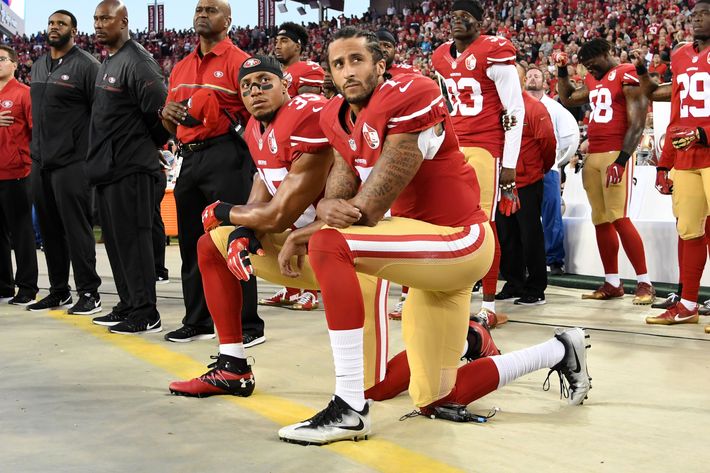
Trump also said on Friday night that football fans should leave a game if players knelt for the anthem, and complained that the NFL had become boring as a result of there being less violence due to new rules designed to protect the players from the very real risk of traumatic brain injuries.
Not content with just taking on the NFL over the weekend, Trump then expanded his attack to NBA superstar Steph Curry on Saturday morning. Curry, a frequent critic of the president, had said he would probably skip the White House visit he and his team, the Golden State Warriors, had earned as a result of winning this year’s NBA championship. After learning this, Trump disinvited Curry and the Warriors via Twitter. The president also continued to reiterate the criticism he made on Friday against the NFL and against its players’ protests. “If a player wants the privilege of making millions of dollars in the NFL, or other leagues,” he tweeted, “he or she should not be allowed to disrespect our Great American Flag (or Country) and should stand for the National Anthem. If not, YOU’RE FIRED. Find something else to do!”
Following Trump’s comments about NFL players and Curry, the president was widely criticized, especially among professional athletes and sports officials and commentators. The hashtag #TakeAKnee became a number-one trend on Saturday on Twitter, and even Lebron James took on the president, earning a near-record number of likes for his tweet on the subject. Also on Saturday, for the first time ever, a Major League Baseball player knelt during the national anthem before a game.
Amid the firestorm, the fact that all of Trump’s targets happened to be black was not lost on many, either. (“This has nothing to do with race,” Trump insisted to reporters on Sunday after the protests took hold. “This has to do with respect for our country.”)
Because of all of this, Sunday’s football protests were all but guaranteed. After all, even NFL team owners who are known Trump supporters made a point to push back against the president, as did many other sports figures.
Nonetheless, the tweet-happy president tried again on Sunday morning, implying, without evidence, that the sport was missing out on America-loving fans because of the controversy.
Though Trump’s attacks seemed mostly intended for Kaepernick and the handful of other players who have decided to protest during the national anthem (and whom he may have seen as easy targets for a base-rallying rant), Trump managed to pick a fight with the entire NFL and much of the sports world instead. So far, he’s losing that game in a blowout.
This post has been updated throughout.






























